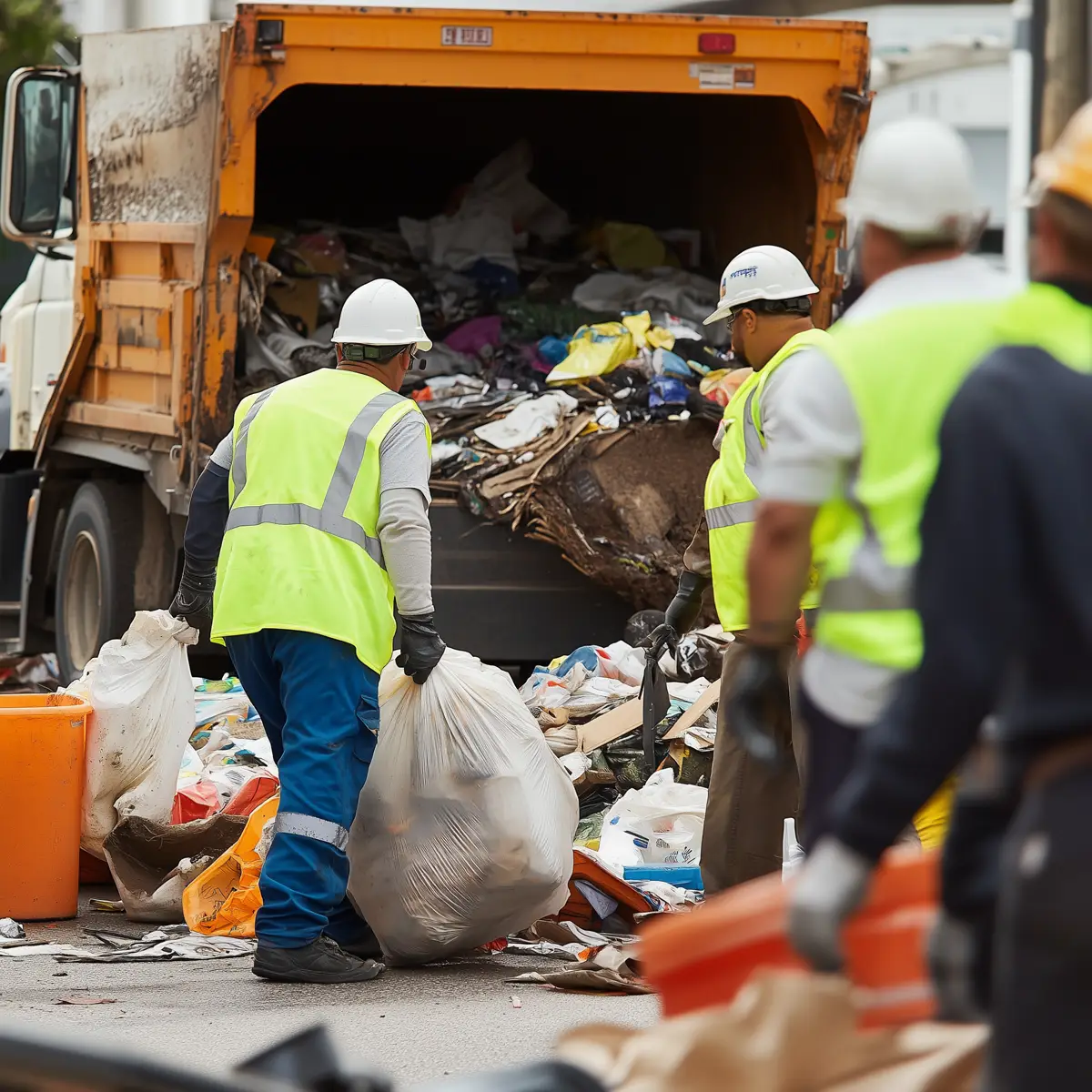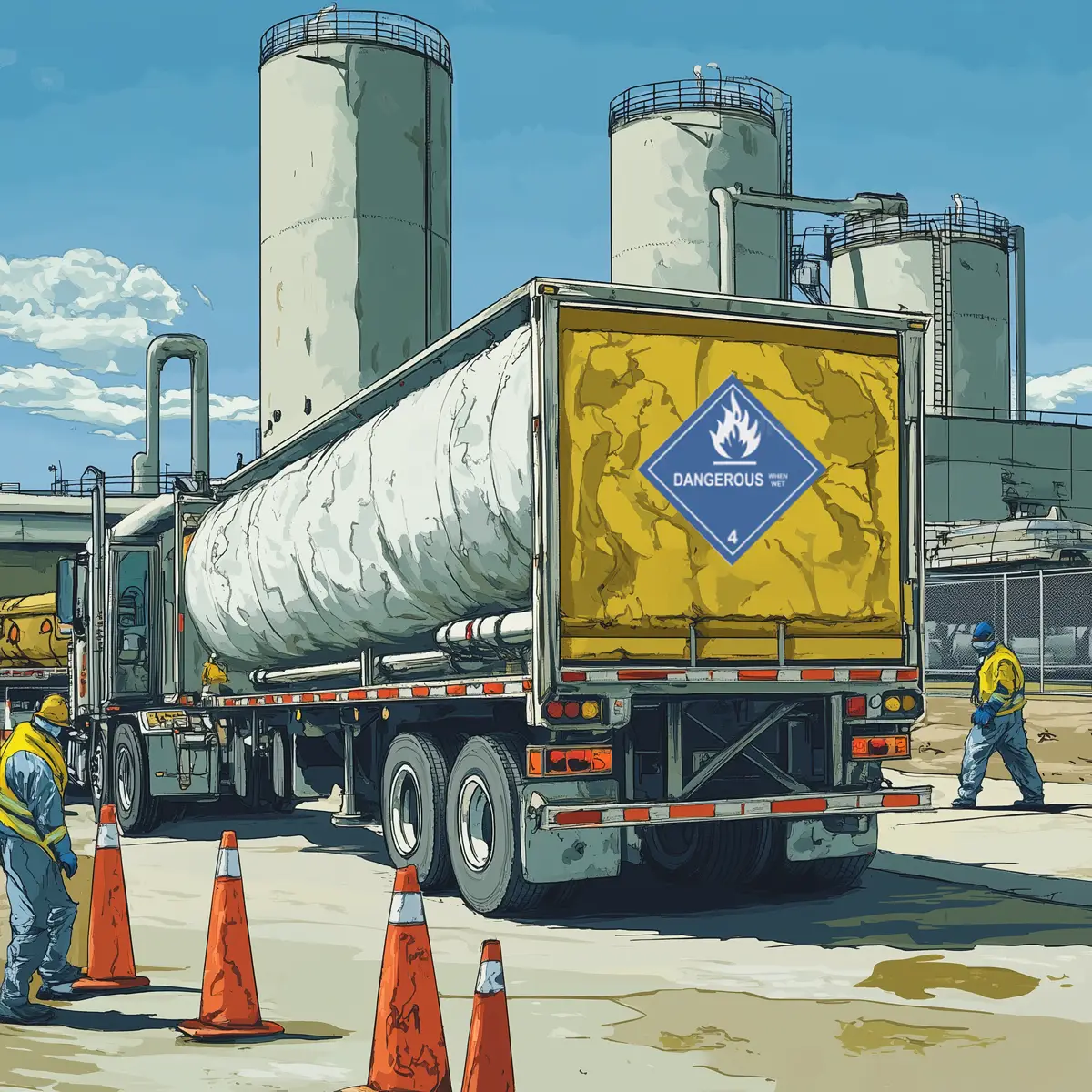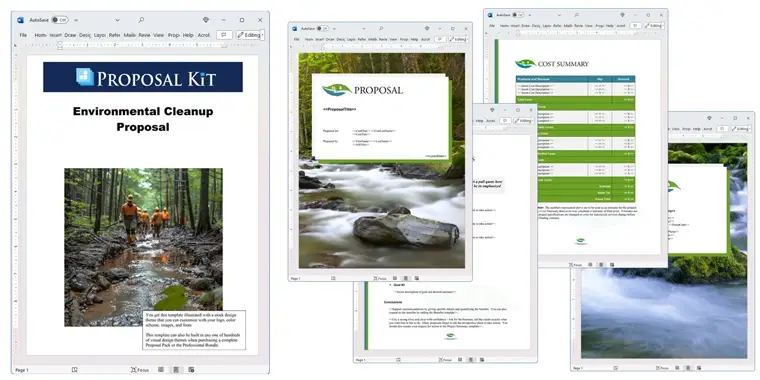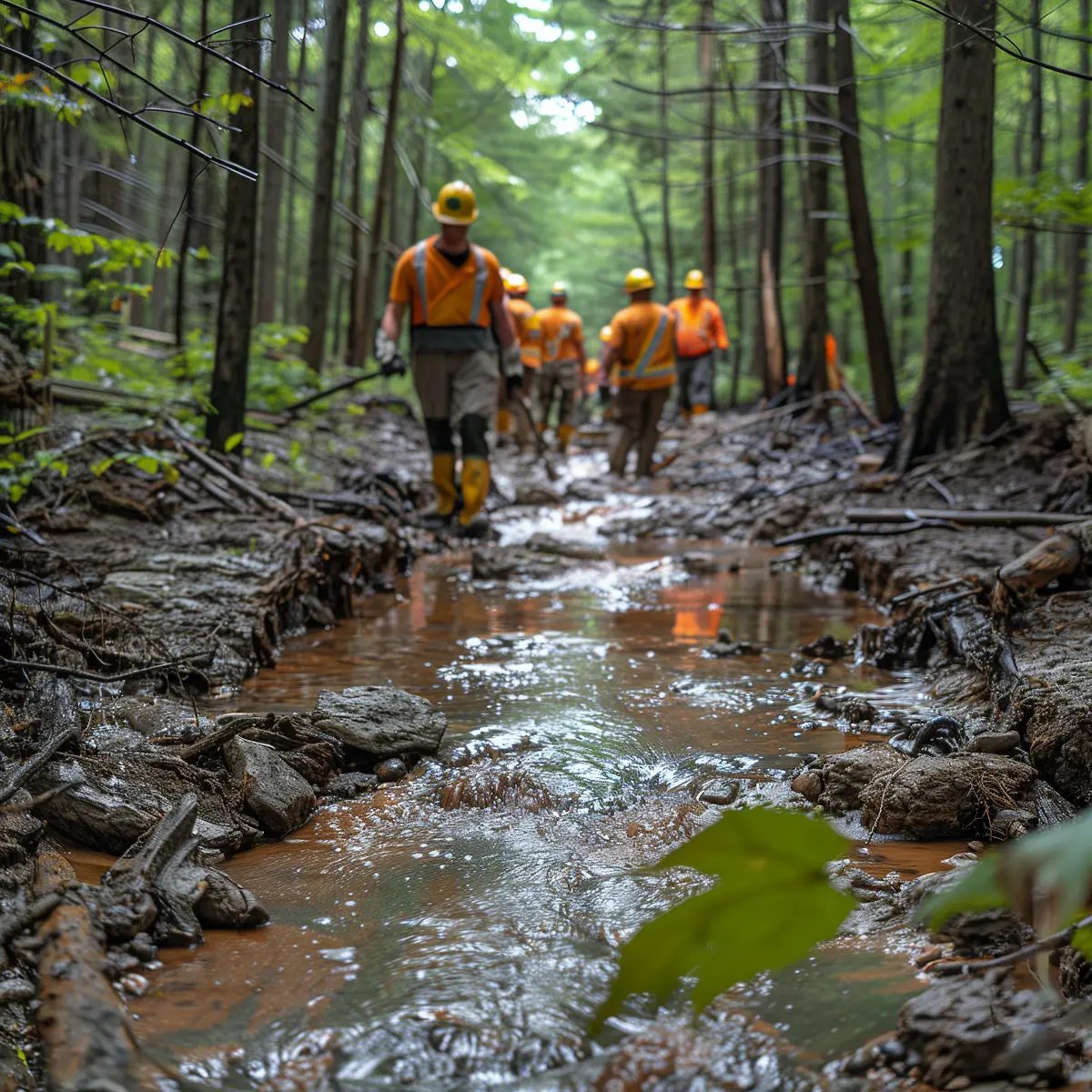How to write your Environmental Cleanup Proposal
We include this 17 page layout with every Proposal Pack. If you want this template to have a different visual design theme than the one illustrated here, purchase any Proposal Pack design and create this template using the purchased design theme. This template is included in every Proposal Pack. If you get a Proposal Pack or the Professional Bundle, you can also make any variation of this template with different chapters to suit your needs.
We typically include more chapters in the templates than most people will need to give everyone more variety in the chapters they may need. You can trim down a long template by removing pages you do not need or combining multiple chapter topics into one page.
 DOWNLOADABLE, ONE-TIME COST, NO SUBSCRIPTION FEES
DOWNLOADABLE, ONE-TIME COST, NO SUBSCRIPTION FEES![]() View Environmental Cleanup Sample Proposal
View Environmental Cleanup Sample Proposal
This sample proposal is based on the same layout as this template and is included in every Proposal Pack. The visual design of the templates will match whichever Proposal Pack design you purchase. To get this template in a different design theme than shown in the sample, purchase any other Proposal Pack design theme and this template will be included.
You can create an editable Word version of this sample in any design theme of your choice including branded to your logo.
 If you need this template on DVD media order from our Amazon shop.
If you need this template on DVD media order from our Amazon shop.
You can also create countless variations of this document to suit your needs using the included library of 2200+ chapters if ordering a Proposal Pack or Pro Bundle.
 What Our Clients Say
What Our Clients SayI did purchase yesterday the Proposal Pack for Any Business and the Wizard. I am very impressed and would like to upgrade to the Proposal Kit Professional."
Related Article
Related Video
Related Templates
- Bioremediation Environmental Services Proposal
- Natural Resources Management Proposal
- Waste Removal and Cleanup Services
- Transportation of Hazardous Waste Proposal
- EPA Federal Government Grant Proposal
- EPA Federal Government Grant Proposal #2
- Disaster Cleanup Services
- Hazardous Waste Processing Proposal
- Environmental Program Proposal
- Post Construction Cleaning Services Proposal
- Recycling Proposal Template
- Trash and Waste Pickup Services Proposal
- Rubber Recycling Proposal Template
What's the best way to write your environmental cleanup proposal?
A proven way to create an environmental cleanup proposal is using the Proposal Kit template and software package. This tool simplifies the process, guiding users through creating detailed and persuasive proposals. Whether new to proposal writing or looking to streamline your efforts, Proposal Kit provides a comprehensive solution that includes templates, a wizard software program, and a line item quoting database system for financial documentation such as cost summaries, quotes, and budgets.
Are you currently facing the challenge of writing an environmental cleanup proposal? If so, you're not alone.
What Types of Projects Are Environmental Cleanup Proposals Written For?
Environmental cleanup projects are crucial for restoring pollution or ecological degradation areas. These projects can vary widely in scope and complexity. Here are ten typical types of environmental cleanup projects:
- Oil Spill Remediation: Cleaning up oil spills in oceans, lakes, and on land.
- Chemical Spill Cleanup: Dealing with hazardous chemical spills in industrial areas.
- Abandoned Industrial Sites Restoration: Rehabilitating old industrial sites left contaminated.
- Lead Removal: Removing lead contaminants from residential and public buildings.
- Asbestos Abatement: Safely disposing of asbestos materials from older constructions.
- Radioactive Waste Management: Handling and disposing of radioactive waste safely.
- Agricultural Cleanup: Addressing pesticide and fertilizer pollution in rural areas.
- Waterway Restoration: Cleaning rivers, streams, and coastlines to improve water quality.
- Wildlife Habitat Restoration: Restoring natural habitats to support wildlife biodiversity.
- Urban Brownfield Redevelopment: Converting contaminated urban areas into usable real estate.
Chapters this template is built with
Using Proposal Kit, you can efficiently assemble a proposal that addresses all aspects of environmental cleanup. Below are key components that should be included, each supported by Proposal Kit's extensive template library
This list represents a small selection from the thousands of templates in the Proposal Kit library. Customize your proposal to cover all necessary topics. Creating the proposal is just one step in the overall project setup.
Cover Letter
The cover letter serves as your organization's formal introduction to a potential client or funding body. It should succinctly convey your organization's expertise in environmental cleanup and express a clear understanding of the project's specific requirements. The letter should also highlight your commitment to environmental stewardship and how your approach aligns with the client's objectives. It sets the tone for the proposal and builds initial trust.
Problem Statement
The problem statement is an integral part of your proposal, as it defines the scope and seriousness of the environmental issues at hand. This section should detail the types of pollutants involved, the extent of the area affected, and the potential risks to public health and the environment. A well-articulated problem statement sets the stage for proposing effective solutions, as it demonstrates your thorough understanding of the challenges.
Cost Summary
In the cost summary, provide a detailed breakdown of all expenses associated with the project, including direct costs like labor and materials and indirect costs such as administrative expenses and possible contingencies. This section should be clear and well-organized, offering transparency to help the client understand how funds will be allocated. Including a detailed cost summary helps establish credibility and reassures the client that the project is financially feasible.
Solutions
This section outlines the specific methods and technologies you propose to employ in the cleanup process. It should describe the techniques for pollutant removal or neutralization and any innovative approaches or technologies that will be used. Additionally, explain why these solutions best fit the specific issues outlined in the problem statement and how they will achieve the desired outcomes efficiently.
Site Preparation
Site preparation is the initial phase of the cleanup process, where the site is readied for actual remediation activities. This part of the proposal should describe the steps to secure the site, such as erecting safety barriers, establishing decontamination zones, and conducting preliminary surveys. It may also cover the logistics of equipment and personnel deployment.
Cleanup
Detail the specific cleanup actions that will be taken to address the contamination. This should include the physical, chemical, or biological methods and how they will be implemented to ensure thorough cleanup. The section should convey a clear plan of action that reassures the client of your capability to manage and execute the cleanup effectively.
Decontamination
Decontamination procedures ensure that all hazardous substances are safely removed and risks of secondary contamination are minimized. Describe the techniques and safety measures used during this phase, such as chemical washes, thermal treatment, or encapsulation of hazardous materials.
Reclamation
Reclamation involves restoring the site to its original state or a new, safe condition. This section should outline the steps to rehabilitate landscapes, restore wildlife habitats, and reintegrate the site into the surrounding environment. Discuss how these efforts contribute to the sustainability and ecological health of the area post-cleanup.
Affected Area
Describe the project's geographic scope, detailing the specific locations and the scale of the cleanup. This description should help the reader visualize the area involved and understand the extent of the work required. It should also mention any particularities of the site that might influence the cleanup process.
Agencies
List the regulatory agencies involved in overseeing the environmental cleanup project. Detail their roles, the specific regulations they enforce, and how their requirements will shape the project. This section is crucial for demonstrating compliance and understanding environmental cleanup's legal landscape.
Environmental Impact
Analyze the potential environmental impacts of both the contamination and the cleanup efforts. This should include the short-term effects of the cleanup process and the long-term benefits to the environment. The analysis should support the necessity and benefits of the proposed cleanup solutions.
Regulations
This part of the proposal covers the governmental and environmental regulations that the project must comply with. It should detail specific statutes and guidelines relevant to the project, demonstrating your organization's knowledge of and compliance with all legal requirements.
Recommendations
Provide professional advice and best practices for the cleanup process and ongoing environmental management post-cleanup. This section can include suggestions for monitoring environmental recovery, community engagement strategies, and future maintenance and oversight recommendations.
Project Summary
Conclude the proposal with a concise summary that encapsulates all the key points discussed. This overview should reaffirm the project's objectives, summarize the proposed solutions, and highlight the anticipated outcomes. The project summary helps reinforce your message and leaves a solid final impression of capability and professionalism.
Use cases for this template
Emily's Story: Small Business Owner's Victory
Emily, the owner of GreenRevive Solutions, faced her biggest challenge yet-a proposal for a large-scale toxic land reclamation project. With the deadline approaching and her experience in formal proposal writing limited, Emily turned to Proposal Kit.
The Proposal Kit's templates provided a structured outline, guiding her through each part of the proposal, from a detailed site analysis addressing potential environmental impacts to a budget that accounted for unforeseen costs. Emily personalized the content to highlight her team's unique skills and previous successes, making her proposal compliant and compelling. The professional caliber of the finished document impressed the project's review board, leading to GreenRevive Solutions winning the contract.
Liam's Story: Meeting the Deadline
Liam, an environmental specialist at EcoSafe Dynamics, was under pressure when tasked with developing an ecological cleanup proposal in just one week. Liam employed the Proposal Kit to bring order and precision to his process. The templates helped him systematically outline each part of the proposal, ensuring nothing was overlooked-from environmental assessments to detailed methodologies for remediation.
To further enhance his proposal, Liam used an AI writing tool to refine the language and align the document more closely with his company's branding, drawing on content from their website. This ensured the proposal was completed on time and infused it with a level of specificity and professionalism that perfectly matched the project's requirements.
His approach paid off when EcoSafe Dynamics was awarded the contract, a testament to his preparation and use of technology.
Nora's Story: Nonprofit Director's RFP Creation
Nora, the director of Clean Earth NGO, was tasked with an ambitious project: overseeing a river cleanup initiative requiring coordination with multiple stakeholders. The project's complexity necessitated a clear, comprehensive RFP to attract and evaluate the right contractors.
Turning to the Proposal Kit, Nora created a detailed RFP that reflected the project's unique challenges and goals. She included precise evaluation criteria, project timelines, and environmental impact assessments, which guided potential contractors in their responses.
The clarity and depth of the RFP facilitated a competitive bidding process, ensuring that submissions were thorough and aligned with objectives. Nora's effective use of the Proposal Kit helped streamline the selection process, ultimately contributing to a well-organized and goal-oriented project launch.
Conclusions and Recommendations
To write a winning environmental cleanup proposal, it is essential to use a structured approach like Proposal Kit. Proposal Kit helps you deliver a professional document that stands out. A well-prepared proposal is your first step toward a successful environmental cleanup project.
Also Known As
This template may also be referred to in different ways or be used in more specialized situations, such as:
- Environmental Remediation Proposal
- Eco-Restoration Funding Proposal
- Pollution Control Project Proposal
- Site Cleanup Grant Proposal
- Environmental Rehabilitation Proposal
- Contaminated Site Remediation Proposal
- Environmental Recovery Plan
- Pollution Mitigation Proposal
- Ecosystem Restoration Funding Request
- Environmental Cleanup Grant Application
Abstract
 Creating an environmental cleanup proposal can seem like a complex task, but using the Proposal Kit can make the process manageable. Proposal Kit offers a comprehensive solution for anyone involved in environmental remediation projects, from newcomers to seasoned professionals. This tool facilitates the creation of detailed proposals for various types of cleanup projects, such as oil spill remediation, chemical spill cleanup, and urban brownfield redevelopment.
Creating an environmental cleanup proposal can seem like a complex task, but using the Proposal Kit can make the process manageable. Proposal Kit offers a comprehensive solution for anyone involved in environmental remediation projects, from newcomers to seasoned professionals. This tool facilitates the creation of detailed proposals for various types of cleanup projects, such as oil spill remediation, chemical spill cleanup, and urban brownfield redevelopment.
Each proposal should begin with a cover letter that introduces your organization and highlights its commitment to environmental stewardship. A well-defined problem statement is crucial, as it outlines the project's scope and the severity of the environmental issues at hand. The proposal should then detail a cost summary to ensure financial transparency and credibility.
The solutions section of the proposal should outline the specific methods and technologies to be employed, ensuring they are tailored to address the issues identified in the problem statement. Site preparation requires a thorough plan, including safety measures and logistics, before actual cleanup begins. This phase may involve various methods like physical, chemical, or biological treatments to ensure thorough decontamination. Reclamation efforts focus on restoring the affected area to its original state or a new, sustainable condition, making the site ecologically viable post-cleanup.
 Throughout the proposal, it's important to address compliance with various regulatory agencies. This includes detailing the environmental regulations that the project must adhere to, which ensures the project aligns with legal and environmental standards. The environmental impact analysis should highlight both the immediate benefits of the cleanup operations and the long-term positive effects on the ecosystem.
Throughout the proposal, it's important to address compliance with various regulatory agencies. This includes detailing the environmental regulations that the project must adhere to, which ensures the project aligns with legal and environmental standards. The environmental impact analysis should highlight both the immediate benefits of the cleanup operations and the long-term positive effects on the ecosystem.
Finally, a project summary should encapsulate all key points, reinforcing the proposal's objectives and anticipated outcomes.
Creating an effective environmental cleanup proposal involves a detailed approach, which the Proposal Kit can facilitate. This comprehensive package provides users with templates and resources necessary for developing professional documents tailored to various types of cleanup projects. Whether dealing with pollution mitigation, ecosystem restoration, or site cleanup grant applications, the Proposal Kit streamlines the process, ensuring all components are addressed thoroughly.
 Each proposal typically begins with a cover letter that serves as a formal introduction, emphasizing the organization's expertise in environmental rehabilitation and its alignment with eco-restoration funding objectives. This section is followed by a problem statement, an important component that delineates the contamination issues, such as those found in chemical spill cleanup or lead removal projects, highlighting the associated risks to both public health and the environment.
Each proposal typically begins with a cover letter that serves as a formal introduction, emphasizing the organization's expertise in environmental rehabilitation and its alignment with eco-restoration funding objectives. This section is followed by a problem statement, an important component that delineates the contamination issues, such as those found in chemical spill cleanup or lead removal projects, highlighting the associated risks to both public health and the environment.
The cost summary provides a meticulous breakdown of expenses, demonstrating how funds for site cleanup grant proposals are allocated to cover both direct and indirect costs, including those for specialized equipment and personnel. This transparency is crucial for building trust with potential clients or funding bodies and is an integral part of an environmental cleanup grant application.
In the solutions section, the proposal must outline the methodologies and technologies employed for pollution control projects, ensuring they are both innovative and effective. These could range from using advanced chemical neutralization techniques to deploying physical barriers in oil spill remediation. Each method should be backed by scientific evidence or precedents from similar successful projects to establish credibility and demonstrate potential environmental recovery outcomes.
 Site preparation is another fundamental topic involving setting up decontamination zones and conducting preliminary surveys for a smooth commencement of remediation activities. The cleanup phase includes detailed actions tailored to the project's specific needs, whether through asbestos abatement, radioactive waste management, or agricultural cleanup efforts. Effective decontamination procedures ensure that hazardous substances are removed safely, minimizing secondary contamination risks.
Site preparation is another fundamental topic involving setting up decontamination zones and conducting preliminary surveys for a smooth commencement of remediation activities. The cleanup phase includes detailed actions tailored to the project's specific needs, whether through asbestos abatement, radioactive waste management, or agricultural cleanup efforts. Effective decontamination procedures ensure that hazardous substances are removed safely, minimizing secondary contamination risks.
Reclamation efforts focus on restoring the affected area's ecological health, turning urban brownfields into usable real estate, or improving wildlife habitat restoration. This is important for achieving the long-term sustainability goals of an environmental recovery plan. The affected area's description provides clarity on the geographic scope and particularities influencing the cleanup process.
Addressing the roles of regulatory agencies is vital for compliance, detailing how the project will meet environmental regulations and obtain necessary permits. An environmental impact assessment should analyze both the contamination's effects and the cleanup's benefits, reinforcing the necessity of pollution mitigation proposals.
 Recommendations for ongoing environmental management ensure continued adherence to best practices post-cleanup, while the project summary ties all topics together, leaving a strong impression of professionalism. Proposal Kit aids in creating compelling and compliant proposals, ultimately contributing to successful environmental cleanup initiatives.
Recommendations for ongoing environmental management ensure continued adherence to best practices post-cleanup, while the project summary ties all topics together, leaving a strong impression of professionalism. Proposal Kit aids in creating compelling and compliant proposals, ultimately contributing to successful environmental cleanup initiatives.
Frequently Asked Questions
What should I include in an Environmental Cleanup Proposal?
An Environmental Cleanup Proposal should include an introduction, problem statement, project objectives, methodology, timeline, budget, qualifications of the project team, and expected outcomes. Additionally, it should address regulatory compliance and environmental impact assessments.
How do I justify the need for the cleanup project in my proposal?
To justify the need for the cleanup project, provide detailed background information on the contamination issue, including historical data, environmental assessments, and the potential health and ecological risks. Highlight the urgency and importance of the cleanup to protect public health and the environment.
What should be included in the budget section of the proposal?
The budget section should provide a detailed breakdown of all costs associated with the cleanup project. This includes costs for site assessments, remediation activities, equipment, personnel, permits, monitoring, and any contingencies. Justify each expense and explain how the funds will be allocated efficiently.
How do I demonstrate the effectiveness of my proposed cleanup methods?
To demonstrate the effectiveness of your proposed cleanup methods, include detailed descriptions of the technologies and techniques you plan to use. Provide case studies or references to similar successful projects, and include scientific data or evidence supporting the chosen methods. Explain how these methods will achieve the desired environmental outcomes.
How can I ensure my proposal addresses all regulatory and compliance requirements?
Ensure your proposal addresses all regulatory and compliance requirements by thoroughly researching and referencing relevant local, state, and federal regulations. Include a compliance plan that outlines how the project will meet these regulations, obtain necessary permits, and conduct regular environmental monitoring and reporting. Consulting with environmental law experts or regulatory agencies can also help ensure compliance.
15% Off Discount
![]() Add To Cart This Word Template Only
Add To Cart This Word Template Only
 Add To Cart Proposal Pack Aqua #7
Add To Cart Proposal Pack Aqua #7
 Add To Cart Proposal Kit Professional Bundle
Add To Cart Proposal Kit Professional Bundle
 4.7 stars, based on 846 reviews
4.7 stars, based on 846 reviewsProposal Kit chapters used in this template
Cover Letter, Title Page, Table of Contents, Problem Statement, Environmental Impact, Solutions, Affected Area, Site Preparation, Cleanup, Decontamination, Reclamation, Agencies, Regulations, Cost Summary, Recommendations, Project Summary, Back Page
Included Calculator Spreadheets
These Excel calculator spreadsheets are included with this template. If you purchase a Proposal Pack or the Professional Bundle, these proposal pages are generated using an automated line-item database in the included Wizard software. The calculator spreadsheets are intended for use when purchasing only the static Word template.
You use this proposal for
- General business proposal
- Non-technical proposal
- Service sales proposal
- Project pitch proposal
- Nature, environmental proposal
How to create this template with Proposal Pack Wizard
You can create this document using any of the logo-designed Proposal Packs. Pick any Proposal Pack with a logo design theme you like best; they will all work equally well. The Proposal Pack for Any Business is the pack with no extra added logos or colors - designed to be used plain or for you to customize with your logos and graphics.
The Proposal Pack design theme you purchase will determine the visual look of this template. The screenshot above only shows the plain generic design theme. Names and stories in examples are fictional; however, the templates are from real client use cases.
We include a library of chapters to be assembled based on your needs. All proposals are different and have different needs and goals. We designed Proposal Pack so you can customize the documents to suit your needs.
You will best create this document using the Proposal Pack Wizard - Expert Edition software to select this template and build it in the Proposal Pack logo design theme of your choice along with any desired customizations (such as adding additional chapters, removing unneeded chapters, changing the order of chapters, and importing your company logo). This template outlines a proposal for the described situation. Each user is responsible for typing in the actual content of the provided pages with their information to complete the proposal. Suggestions in the abstract may include features in higher-end packages and are facilitated by the selection of chapter templates to support the narrative of each proposal, which help guide the user in filling in the details.
You create this template using the Wizard software with an entire Proposal Pack library and software. We include the Expert Edition of the software in the Proposal Kit Professional bundle. Microsoft Word for Windows is required to use the customizing software. You can also edit Word document templates in other office software such as Word for Mac. We will assist Mac users in assembling complex templates for their first project if they do not have the required platform to run the Wizard software.
You only get the single assembled Word document if purchased as a stand-alone template. The individual template products include no other templates, samples, or software.
How to Build Templates Featured on Proposal Kit Website
Many people find the Proposal Kit website after searching for a specific proposal. Once you've purchased and installed the software, how do you build that template you found in the first place? This video shows you how to build any proposal you see on the Proposal Kit website.
Key Takeaways
- The Environmental Cleanup Proposal is available as a ready-to-edit template.
- You can create unlimited custom variations of this template using a Proposal Pack or the Professional Bundle.
- Using a Proposal Pack or Professional Bundle, you can automate quotes and other financial pages with a line-item database.
- There are no ongoing subscription fees. You get lifetime unlimited use.
- We made Proposal Kit for freelancers, small businesses, and non-profits.
- Proposal Kit product content (templates, samples, software) is 100% written by humans.
 Ian Lauder has been helping businesses write their proposals and contracts for two decades. Ian is the owner and founder of Proposal Kit, one of the original sources of business proposal and contract software products started in 1997.
Ian Lauder has been helping businesses write their proposals and contracts for two decades. Ian is the owner and founder of Proposal Kit, one of the original sources of business proposal and contract software products started in 1997.By Ian Lauder
 Published by Proposal Kit, Inc.
Published by Proposal Kit, Inc.


 Cart
Cart


 Get 15% off ordering today:
Get 15% off ordering today: 

 Facebook
Facebook YouTube
YouTube X
X Search Site
Search Site